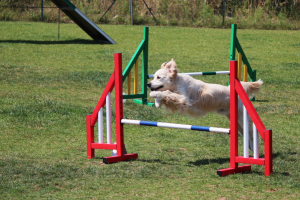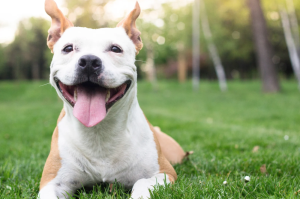
Tips for a Happy and Healthy Older Pup:
Socialization plays a crucial role in preparing your aging furry friend to enjoy interactions, feel comfortable around other animals and people, and adapt to various situations. So let’s explore the signs of an unsocialized senior dog and provide valuable tips for socializing them effectively, and promoting a happy and healthy lifestyle.
Signs of an Unsocialized Senior Dog:
Reactivity, aggression, and anxiety are common signs of an unsocialized senior dog. Recognize excessive barking, whimpering, panting, growling, showing teeth, biting, cowering, shaking, and hiding their tail between their legs as indicators of their discomfort. It’s important to understand that these reactions do not define their personality, but rather stem from past negative experiences or lack of exposure. Luckily, these behaviors can be worked on and it is up to you as their owner to decide what is best for them!
Socialize Your Dog Properly and They Will Thank You!
Socialization offers numerous benefits for your senior dog’s well-being. By exposing them to various stimuli, you can help reduce reactivity and prevent unwanted behaviors such as aggression and timidness. Additionally, socialization eases anxiety in new environments, improving their overall mental health. Furthermore, it boosts their confidence, enabling them to navigate life’s challenges with ease.
Effective Strategies for Socializing Your Senior Dog:
- Regular Walking: Take your senior dog on walks to familiarize them with the outdoors and expose them to different people, dogs, and sounds. Start with walks around your neighborhood before gradually introducing them to environments like dog parks.
- Controlled Exposure: Introduce your dog to new dogs and people in a controlled setting, such as your home. Begin with one person or dog at a time to prevent overwhelming your senior pup.
- Teach Tricks: Engage your senior dog in learning new tricks to keep them mentally stimulated and boost their confidence. A mentally sharp and self-assured dog can better handle stressful situations.

- Agility Classes: Consider enrolling your senior dog in agility classes. These classes provide physical exercise, training opportunities, and exposure to other dogs, enhancing their confidence. If you are in the Orange County area, check out Zoom Room for an awesome agility class!
- Observe Confident Dogs: Encourage interactions with well-behaved and confident dogs. Observing their behavior can teach your dog to respond similarly in various situations.
- Positive Reinforcement: Use rewards like verbal praises, treats, or clickers (if clicker trained) to reinforce positive behavior. This association between good behavior and approval strengthens their socialization progress.
- Remove Stressors: If your dog has an intense aversion to something, consider removing that stressor from their environment. For example, if they fear the vacuum, take them to another room and provide distractions like loud music or treats while you vacuum elsewhere.
- Avoid Punishment: Never punish your dog for fear-based reactions. Instead, focus on positive reinforcement to correct their behavior and build their confidence.
- Small Doses and Patience: Gradually introduce your senior dog to new experiences to avoid overstimulation or overwhelming them. Socialize in small doses, keeping them interested and focused. Above all, exercise patience as socialization is a gradual process unique to each dog’s pace.
Ask For Help!
- Consult a Professional: Seek guidance from a professional dog trainer who specializes in socializing overly reactive dogs. They can provide personalized tips and tricks to assist your senior dog in becoming more comfortable around others.
- Research Online Resources: Utilize valuable dog training information available online. Articles, blogs, videos, and tutorials can supplement your knowledge and provide additional insights. Click here for a video on some tips and tricks for socializing your pup quickly and safely!
- Consult Your Vet: If your senior dog’s anxiety or reactivity persists despite training efforts, consult your veterinarian. They can offer advice on prescription medications or natural supplements to help relax your dog in stressful situations.
You Got This!

With the right approach and dedication, you can successfully socialize your senior dog, ensuring they lead a peaceful and fulfilling life. By recognizing the signs of unsocialized behavior and implementing effective strategies such as controlled exposure, positive reinforcement, and professional guidance, you can help your older pup overcome reactivity, aggression, and anxiety. Remember, you and your senior dog are a team, and together, you can create a happy and healthy environment for them to thrive.
For more information on socializing your senior dog and getting them comfortable around other dogs, check out our blog on introducing a senior dog to a younger dog!
